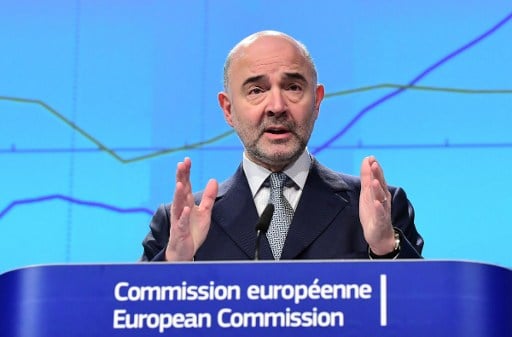BUSINESS
EU ‘disappointed’ in Swiss rejection of corporate tax reform
The EU is “very disappointed” in the Swiss people’s rejection of the government’s corporate tax reform plan, the EU’s tax commissioner has said.
Published: 14 February 2017 10:10 CET

EU tax commissioner Pierre Moscovici. Photo: Emmanuel Dunand/AFP
The result will naturally have an influence on cooperation between the two, Pierre Moscovici said in a Brussels press conference on Monday reported by Swiss media.
“The rejection of the reform and referendum means we need to redouble our efforts when it comes to taxation. The Commission plans to consult the member states so we can decide together how to proceed”.
The Organisation for Economic Cooperation and Development (OECD) has criticized Switzerland's “harmful” current tax system for offering lower tax rates for foreign companies than for domestic ones.
Switzerland had agreed to end that imbalance by 2019. The proposed reform would have addressed the issue, while also introducing new measures designed to make Switzerland an attractive and competitive place for multinationals.
But voters largely agreed with opponents who said the changes would have left a hole in public finances, with ordinary tax payers left to make up the shortfall.
With the reform rejected, the government now fears Switzerland could be blacklisted as a tax haven, though the tax chief of the OECD on Monday denied to Swiss media there was any such list.
Nevertheless, international pressure will remain on Switzerland to reform its tax practices in the next two years.
“Thanks to our joint efforts, Switzerland has turned the page, becoming a constructive international partner in the fight against tax evasion and fraud,” said Moscovici.
“In 2014 member states and Switzerland agreed to bring to an end harmful tax practices and Switzerland agreed to respect international rules set by the OECD”.
Switzerland must now go back to the table to find a new way to meet its obligations, something that may mean a compromise between the political left and right, on opposing sides in the debate.
“We must take into account the people’s vote,” Christian Democrat MP Guillaume Barazzone told Le Tribune de Genève.
“That obliges us to look again at taxation…. we must find a compromise with the left,” he said.
“The population has sent us two messages,” said Liberal-Radical Olivier Feller. “They don’t want tax losses to translate into higher taxes for the people. And they don’t want opaque tax practices that lower taxes for the benefit of companies”.
On the left, Socialist MP Roger Nordmann told the paper his party was ready to talk.
“We are not going to be arrogant and assume that 60 percent of Swiss have suddenly become socialists,” he said.
Url copied to clipboard!


 Please whitelist us to continue reading.
Please whitelist us to continue reading.
Member comments